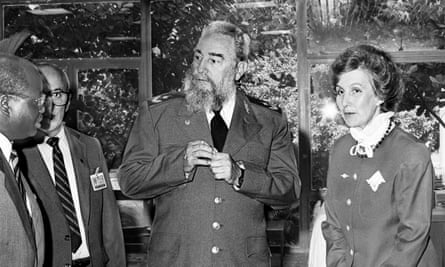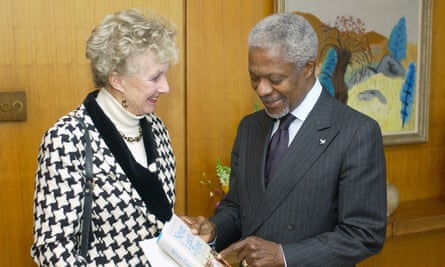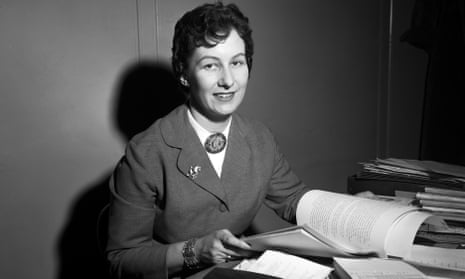Dame Margaret Anstee, who has died aged 90, was one of the most colourful figures in the history of the United Nations, proving over and over again that a woman can succeed in a man’s world without sacrificing her principles or her sense of humour. She had a whole string of firsts to her name, of which the most often cited perhaps does her least justice, because it is the most bureaucratic: she was the first female staff member to reach the rank of undersecretary general, which she did in 1987 when she became head of the UN’s “third headquarters”, its office in Vienna.
She is still remembered in that city with great affection, but her most spectacular exploits occurred in far more dangerous and exotic places. First hired as a local staff member in Manila in 1952, she went on to serve in several countries in Latin America, and also in Ethiopia, Morocco and finally Angola – where, as head of an understaffed and underfunded UN peacekeeping mission, she oversaw the 1992 elections and tried desperately, but in the end unsuccessfully, to prevent the country sliding back into civil war.
In between, she held important posts in Geneva and New York, as well as Vienna, struggling to introduce greater coherence and rationality into the UN’s rambling technical assistance machinery, but always happier when working in the field to help the world’s poorest peoples and those experiencing the greatest suffering.
Her competence and calmness under fire (both literal and metaphorical), her willingness to live, work and travel in the most uncomfortable circumstances and her ability to make friends wherever she went were grudgingly but increasingly recognised by her superiors. Successive UN secretaries general turned to her for the most arduous troubleshooting missions.
Earlier she had had a brief career in the Foreign Office; in 1955 she was shortlisted to succeed Denis Healey as international secretary of the Labour party; and in 1967-68 she served as deputy (and briefly successor) to Thomas Balogh when he headed Harold Wilson’s personal thinktank in No 10.

Anstee was born in the village of Writtle, near Chelmsford, Essex, where her father, Edward, worked for a local printer. Her mother, Annie (nee Mills), had been in domestic service in Herefordshire before she married. Both parents, having had to leave school at 14 and 12 respectively, “deeply resented the lack of further education”, she wrote, and “determined to have only one child, and to ensure it the best education they could manage”.
They succeeded. Despite a series of illnesses, and the conviction of the village school headmistress “that country children were not as intelligent as our town counterparts, and that those of us who had the misfortune to be female were even less so”, Margaret progressed to Chelmsford county high school for girls and eventually, after learning Spanish in three months at the age of 17 in defiance of the school authorities, to read modern and medieval languages at Newnham College, Cambridge, where she got a first, and also displayed the social and technical skills that were to stand her in good stead in her future career. Invited to an Oxford ball, in the days of postwar clothes rationing, she kitted herself out in a dress “made from a surplus military parachute of white nylon, then a totally new fabric”.
After a year lecturing in Spanish at Queen’s University Belfast, she joined the Foreign Office, which had just been opened to women, in 1948. To her delight, Anstee was assigned to the South American department, only to find “that it was Foreign Office policy never to send a woman diplomat to Latin America, for fear she would succumb to the wiles of ‘some passionate Latino’”.
A similar logic (or lack of it) required women diplomats to resign if they got married. Anstee’s brief and unhappy marriage to a Foreign Office colleague thus brought her own career as a British diplomat to a premature end, but also accidentally launched her UN career, since she found herself in the Philippines with time on her hands, and needing money to pay her fare home.

This led eventually to a series of postings as UN representative – in Colombia (1956-57), Uruguay and Argentina (1957-59), Bolivia (1960-65), Ethiopia (1965-67), Morocco (1969-72) and, most traumatically, Chile (1972-74), where she witnessed the coup against Salvador Allende. Many people she had worked with were killed or tortured, and she found herself engaged in a desperate battle to rescue members of her own staff, as well as foreigners who had taken refuge in Chile from authoritarian regimes elsewhere.
In all these countries she became a trusted adviser to the government on economic policy, devising and implementing many development projects; she was also a shrewd observer of the foibles and eccentricities both of local officials and of her UN colleagues and bosses. In 1968-70, working with Sir Robert Jackson (“Jacko”) – who became her life partner until his death in 1991 – she produced perhaps the best argued, most comprehensive plan for rationalising and streamlining the UN’s development work yet seen. Alas, like so many UN reform plans before and since, its implementation was largely blocked by a coalition of vested interests in the secretariat and in national governments.
Anstee retired in 1993, and was made a dame the following year. In retirement she divided her time between her beloved Bolivia, where she built herself a house on the shore of Lake Titicaca, and her mother’s home county, Herefordshire, where she shared a beautiful house and garden on the Welsh border with her aunt Christina, who died in 2000.
Both her personality and her achievement are well expressed in the title Anstee chose for her highly entertaining autobiography, Never Learn to Type (2003), which should be required reading for all new recruits to the UN, irrespective of gender or nationality. Throughout her life she rebuffed attempts (of which there were many) to confine her to roles considered appropriate and “safe” for a woman to undertake. She knew she had far more to offer than that, and no glass ceiling could long hold her down.

Comments (…)
Sign in or create your Guardian account to join the discussion